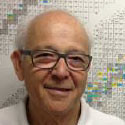Israel Nowik
Lecture title: Lattice Dynamics, Phase Transitions, Spin Relaxation and Valence Fluctuations in Ferrocenoids.
Israel Nowik was educated at The Hebrew University of Jerusalem, where he obtained his MSc degree in Physics and Mathematics (1960) and PhD degree in the field of the Mössbauer spectroscopy (1963). I. Nowik was promoted to Senior Lecturer at the Hebrew University of Jerusalem in 1967, Associate Professor in 1971, Professor in 1975, and Emeritus in 2006.
From 1964 to 1966 he was a visiting scientist at Bell Telephone Laboratories (BTL) in Murray Hill, New Jersey, USA (group of G.K. Wertheim), where he made major contributions to the understanding of spin relaxation in insulating, metallic, paramagnetic, and magnetically ordered rare earth compounds. In 1966 he moved to Yale University, where he was appointed an Assistant Professor with a five-year senior track position in order to establish a Mössbauer research laboratory.
From 1971-1972 Professor Nowik spent his sabbatical year in Argonne National Laboratory, where he studied 237Np in neptunium intermetallic compounds. From 1976-1977 he was a visiting professor at Columbia University in New York and from 1989-1990 at Free University of Berlin.
Professor Nowik has published more than 330 papers, 13 review papers and is a coauthor of four books. His papers are cited 6298 times (h-index= 42). His research interest includes: rare earth and iron valence instabilities in metal-insulators; iron-manganese oxide strong magnetic materials; lattice dynamics in biological iron-containing systems and in iron- organometallics; superconducting and magnetic properties of Ru-containing materials.
This site uses cookies.
Some of these cookies are essential, while others help us improve your experience by providing insights into how the site is being used.
For more detailed information on the cookies we use, please check our Privacy Policy.
-
Necessary cookies enable core functionality. The website cannot function properly without these cookies, and can only be disabled by changing your browser preferences.
